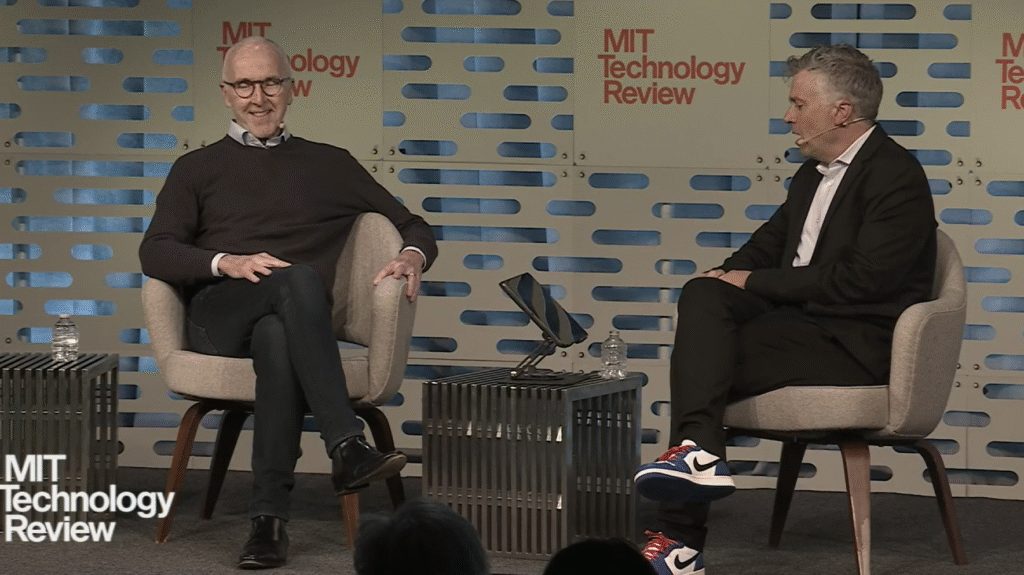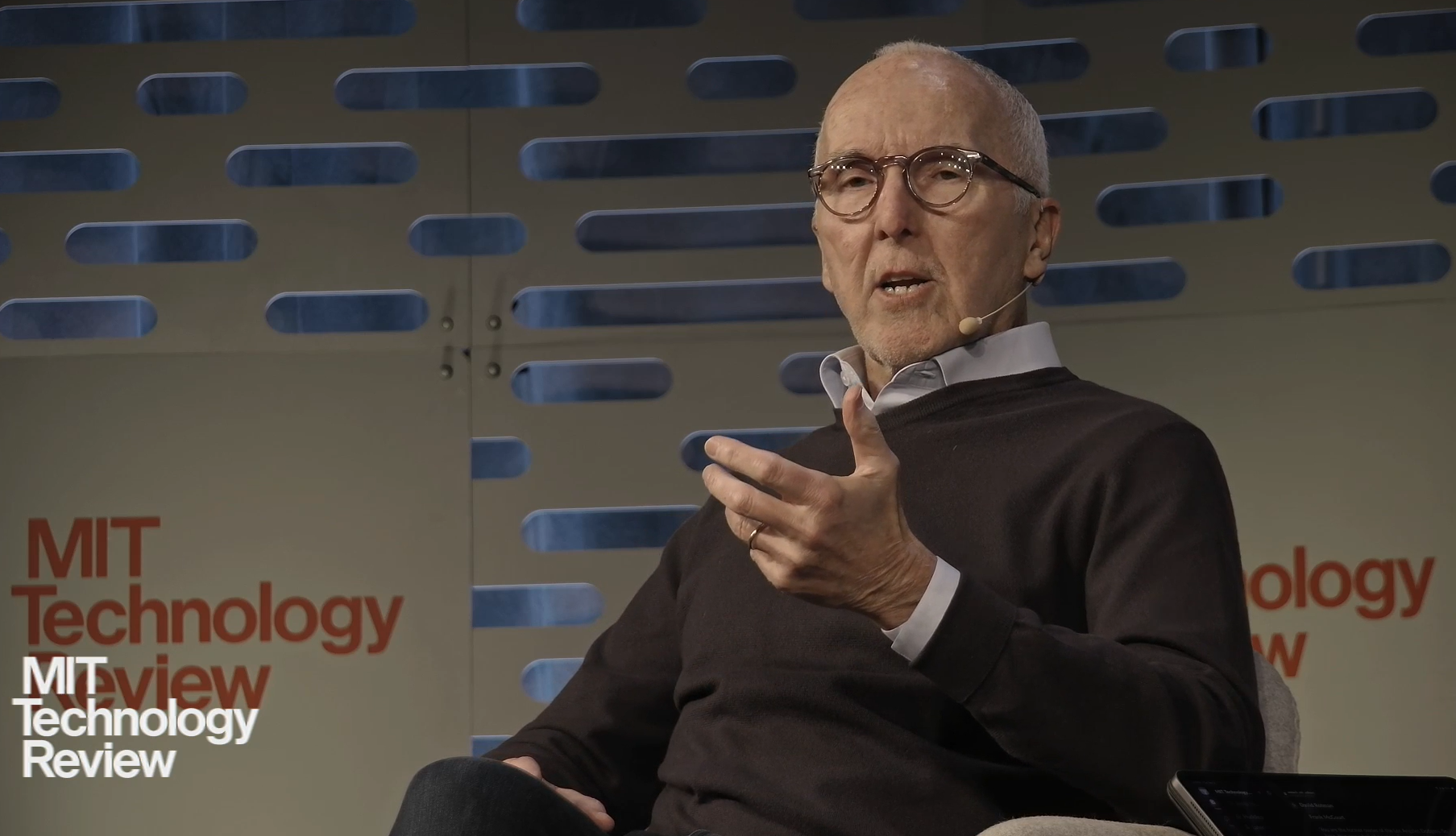EmTechMIT, Cambridge, MA: Frank McCourt Jr., founder of Project Liberty and former owner of the Los Angeles Dodgers, delivered a deeply personal and impassioned talk about what he calls the broken design of the internet, and how to fix it. His central claim: the web’s evolution from an open, human-centered system into a centralized, extractive attention economy represents one of the most urgent civic challenges of our time.
From Personal Crisis to Civic Mission
McCourt traced his awakening to the destructive side of technology back to 2010, during his highly publicized divorce while owning the Dodgers. Watching social media’s rising influence, he witnessed firsthand how platforms had evolved from connection tools to performative, algorithm-driven ecosystems that rewarded outrage, polarization, and surveillance.
“It was like being handed a garden hose with low pressure to fight a fire while thousands were pouring gasoline on it,” he recalled.
That experience redirected his focus from business to technology reform. His first step was civic: founding Georgetown University’s McCourt School of Public Policy and embedding a data institute within it. Yet, within a few years, he realized public policy alone couldn’t keep pace with exponential technologies. The solution, he concluded, had to be technological.

Project Liberty: Building a New Core Layer of the Web
Working with leading technologists, McCourt envisioned “a new core layer of the internet”, a protocol giving individuals control over their data and social graph, much as TCP/IP connected devices and HTTP connected information. He invested a billion dollars to make it real.
That initiative became Project Liberty: a multi-pronged effort comprising technology, policy, and a public movement. Its foundation is the Decentralized Social Networking Protocol (DSNP), an open infrastructure enabling users to own their data, permission its use, and transfer it freely across platforms. About 14 million people are already using it in some form.
“Right now, the design is wrong. We can fix it, but only if we seize the moment while technology itself is evolving,” he said, referring to the shift from the app-centric to the agentic web.
The Human-Centered Internet
McCourt stressed that he is not anti-technology; rather, he is deeply pro-tech, but pro-human-first design. He warned that the current system, with massive power concentrated in a few companies, is eroding democracy, distorting truth, and commodifying human behavior.
He criticized both “pro-tech versus anti-tech” and “U.S. versus China” narratives as false choices: “Do we really want to compete with China by becoming China, by building surveillance technology controlled by a few elites?” he asked.
For McCourt, the central issue is agency. “Data is personhood,” he said. “Every personal data point isn’t just information, it’s part of who we are.” Allowing centralized platforms to harvest and weaponize this data, he argued, is equivalent to surrendering autonomy.
From Attention Extraction to Data Empowerment
The evolution of the attention economy, McCourt explained, began innocently enough: social platforms collected data to sell ads. Over time, algorithms became so sophisticated that they now infer behavioral tendencies, vulnerabilities, and desires with uncanny precision.
“That’s why it feels like Instagram is listening,” he noted. “It’s not, it just knows you too well.”
He warned that this manipulative infrastructure, now amplified by generative AI, poses new dangers. With chatbots mimicking empathy and conversation, people, especially youth, are sharing intimate, vulnerable feelings that systems harvest without meaningful safeguards. “Our information, our experiences, our emotions are being absorbed into corporate models. It’s a profound violation of personhood,” he said.
Europe’s Model and the Power of Design
McCourt hailed Europe’s commitment to aligning technology with social values as a policy model. With privacy frameworks like GDPR and a growing appetite for alternative tech stacks, European governments are treating Project Liberty as a potential transatlantic counterpart to U.S. systems.
“People there are tired of importing American technology that undermines their democracy and exploits their children,” he remarked. “Europe is serious about a different design.”
Envisioning a Data-Sharing Economy
At the heart of McCourt’s vision lies a fundamental inversion of value flow: ordinary people should be compensated for their data, just as utilities charge for electricity. He described a future where personal data is tracked via micro-meters, and users receive micropayments each month based on authorized use.
“Imagine if, instead of paying the meter, the meter paid you,” he said. Two dozen economists from institutions including MIT are currently designing potential frameworks for such a data-sharing economy.
Restoring Agency, Trust, and Flourishing
McCourt rejects the notion that this is a lost cause. He called for simultaneous progress on three fronts:
- Re-engineering technology to return control and transparency to users.
- Establishing policy that harmonizes with human and democratic values.
- Mobilizing individuals, especially parents, to demand safer systems.
He believes this convergence could rebuild trust in truth, community, and governance. More than a technical challenge, he positioned it as a moral and civilizational one.
“The last time humanity faced this kind of power shift, we fought to become citizens instead of subjects,” he said, invoking the spirit of Thomas Paine’s Common Sense. “Today, we’re becoming digital subjects under new monarchs, data empires with no accountability. I want to be a digital citizen.”
The Next 250 Years
McCourt tied his appeal to history and legacy. As a descendant of builders who helped construct America’s physical infrastructure, he now sees Project Liberty as foundational to rebuilding its digital infrastructure, one rooted not in extraction but empowerment.
“This country was built on roads, bridges, and shared vision,” he said. “Let’s make sure the next 250 years are built on digital infrastructure that honors human dignity, not undermines it.”


Leave a Reply
You must be logged in to post a comment.